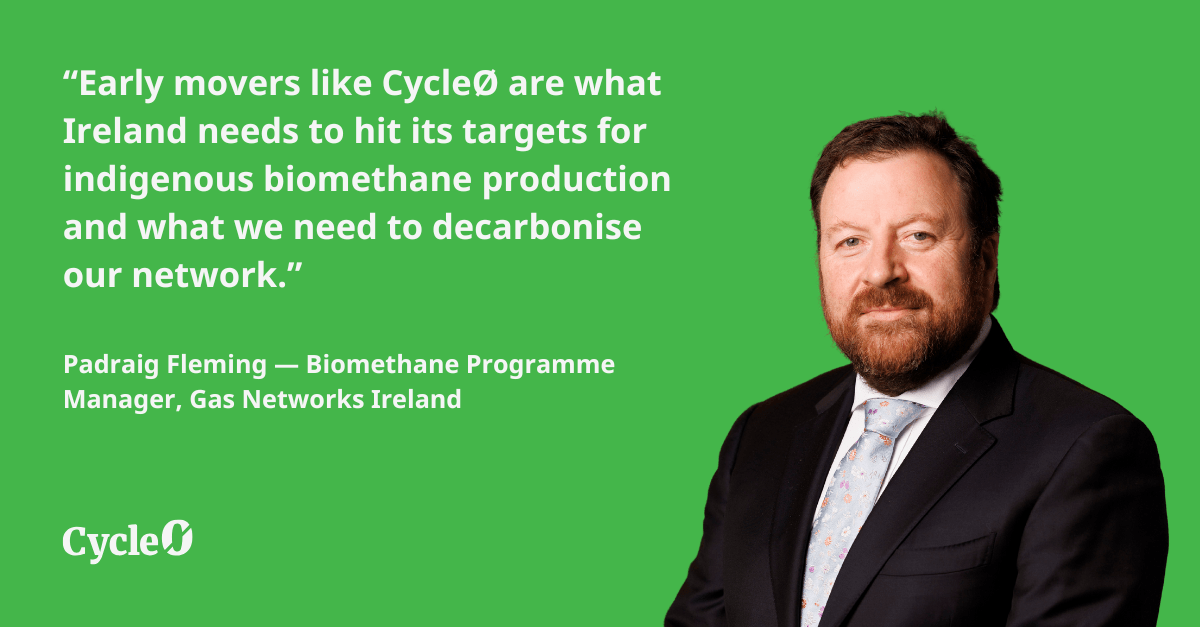Before the COP29 summit, it was announced 2024 will likely be the warmest on record with global temperatures on track to be 1.5 degrees above pre-industrial levels. That means we need to continue focusing on reducing carbon emissions and finding new ways to live sustainably without fossil fuels.
One solution is increased use of anaerobic digestion (AD) to generate renewable gas. AD is a trusted process for producing biogas from agri-food waste and other by-products, generating gas that can be upgraded for grid injection.
This process reduces carbon emissions and generates a nutrient-rich liquid fertiliser byproduct known as digestate, which enables simpler nitrate management and sustainable farming.
A single biomethane plant produces enough gas each year to heat thousands of Irish homes and contribute to the Irish Government’s ambition to produce 5.7 TWh of indigenous biomethane by 2030.
Anaerobic digestion plants bring wider benefits
Along with AD plant outputs, the construction and operation of a plant bring wider benefits.
For farmers, supplying feedstock like slurry and manure generates a long-term, stable solution to waste management and offers peace of mind for those concerned with nitrate derogation.
Farmers can turn slurry from an expensive problem to be managed into an opportunity by selling it to anaerobic digestion plants for feedstock. This is particularly helpful for smaller farms, as it removes the need for renting additional land or building new storage facilities.
Farming families can also choose to partner with an AD developer to sell or let land for plant sites, gaining access to low-cost digestate. Compared to synthetic fertilisers, digestate provides a more balanced nutrient profile that better supports healthy crop and protects water courses from nitrate run-off.
For local communities, each biomethane plant generates jobs during construction and local green jobs in plant operations. That will bring new, long-term sustainable employment to Irish farming communities.

New investment in 4 sites in Ireland
CycleØ recently announced plans to invest in 4 new biogas plants in Ireland. The 4 plants in Kildare, Cavan, Galway and Limerick are expected to generate a total of 160 GWh of biomethane annually, enough to heat over 12,000 Irish homes for a year.
As part of the development process, CycleØ will work closely with communities near the anaerobic digestion plants, local planning authorities and key stakeholders like Gas Networks Ireland (GNI). Local public meetings will be held close to each of the plants and residents can find information about these on our Facebook page and our dedicated web page for farmers.
CycleØ is based in Ireland and headed locally by Country Manager, James Manley—who is from a multigenerational Cork farming family. The company is an expert biomethane plant developer, with anaerobic digestion plants already operating elsewhere in Europe. CycleØ has successfully deployed ammoniacal nitrate stripping technology in Spain which produces a digestate by-product that can be used directly on the land to support soil health and local water resources.
Securing the future of farming
John Hanrahan, who farms a 400-cow dairy herd and pig production unit outside Granagh, Co. Limerick is one farmer who has partnered with CycleØ to build an AD plant.
John sees this plant as this as another step towards sustainability. “We decided to partner with CycleØ to secure the future of our farm. We’re looking at our slurry as a fertiliser, not waste,” he says. “Partnering with CycleØ will help us incorporate it into our system.”
Speaking about the plants, Gas Networks Ireland Biomethane Programme Manager Padraig Flemming said “Gas Networks Ireland is looking for companies like CycleØ to invest in biomethane production, to support our Pathway to a Net Zero Carbon network, our role in achieving the government’s climate targets and transitioning Ireland to a carbon neutral economy by 2050. The CycleØ investment plans fit into the Foundation stage of GNI’s strategy, which will introduce more biomethane, when the networks will be prepared to transport higher volumes of biomethane, between 2024 and 2027.
“Early movers like CycleØ are what Ireland needs to hit its targets for indigenous biomethane production and what we need to decarbonise our network. We’ll be working closely with James Manley and the rest of the CycleØ team to support their plans and to get the plants built and connected to our network”.
If you’re a farmer looking to become a feedstock supplier, or have land to sell or lease, get in contact with CycleØ today. Visit dedicated page for farmers to see our list of FAQs and follow us on Facebook, Instagram or LinkedIn.